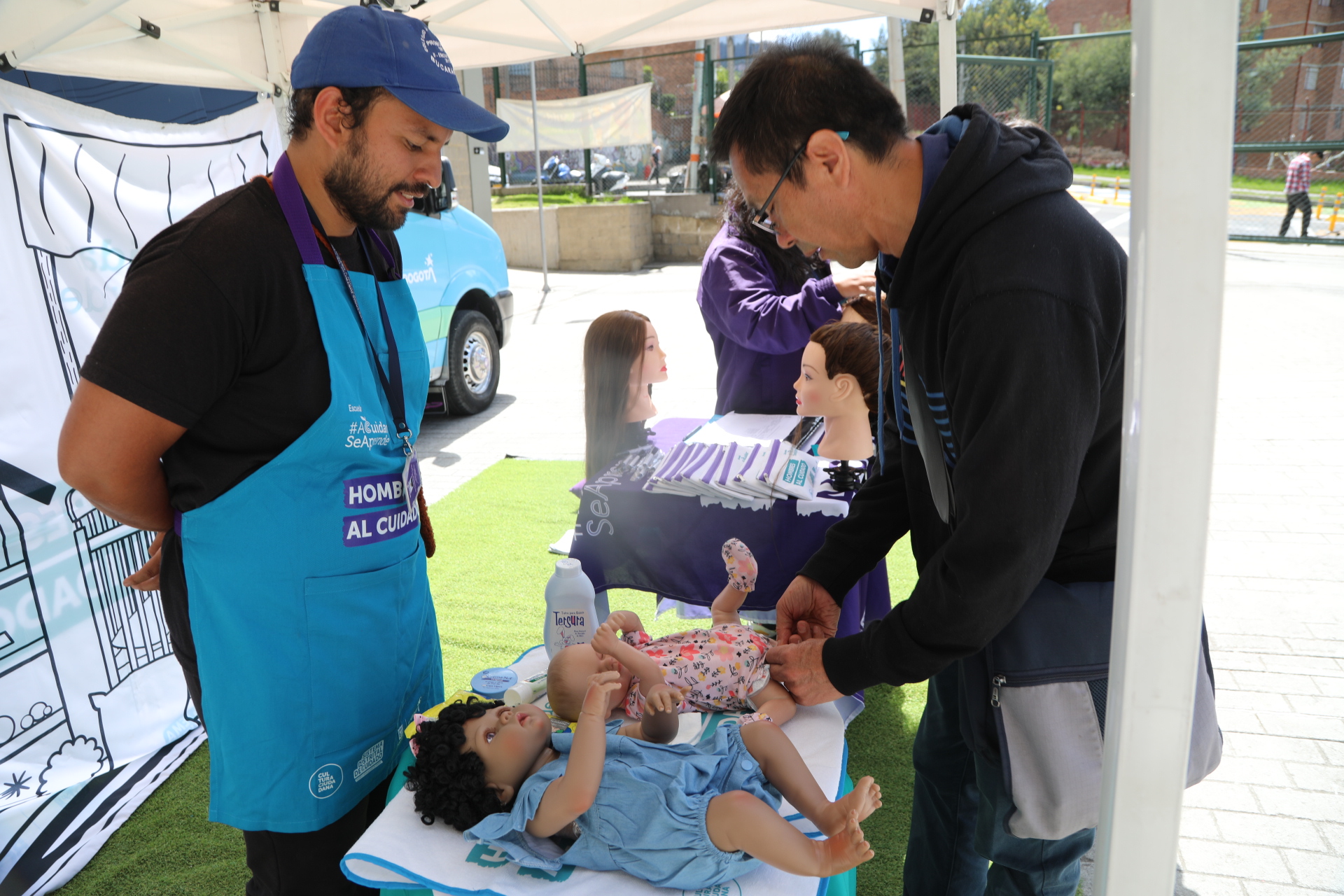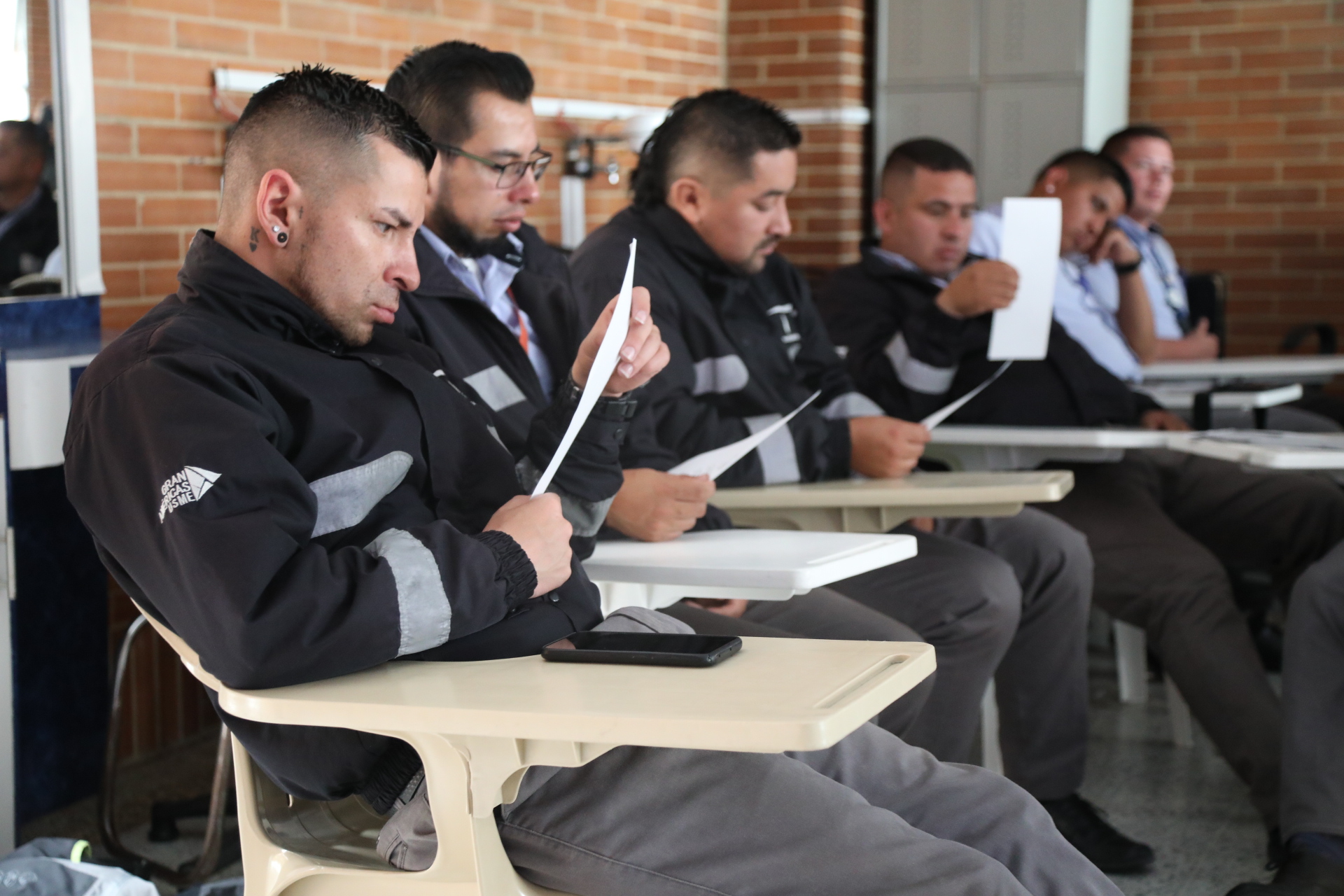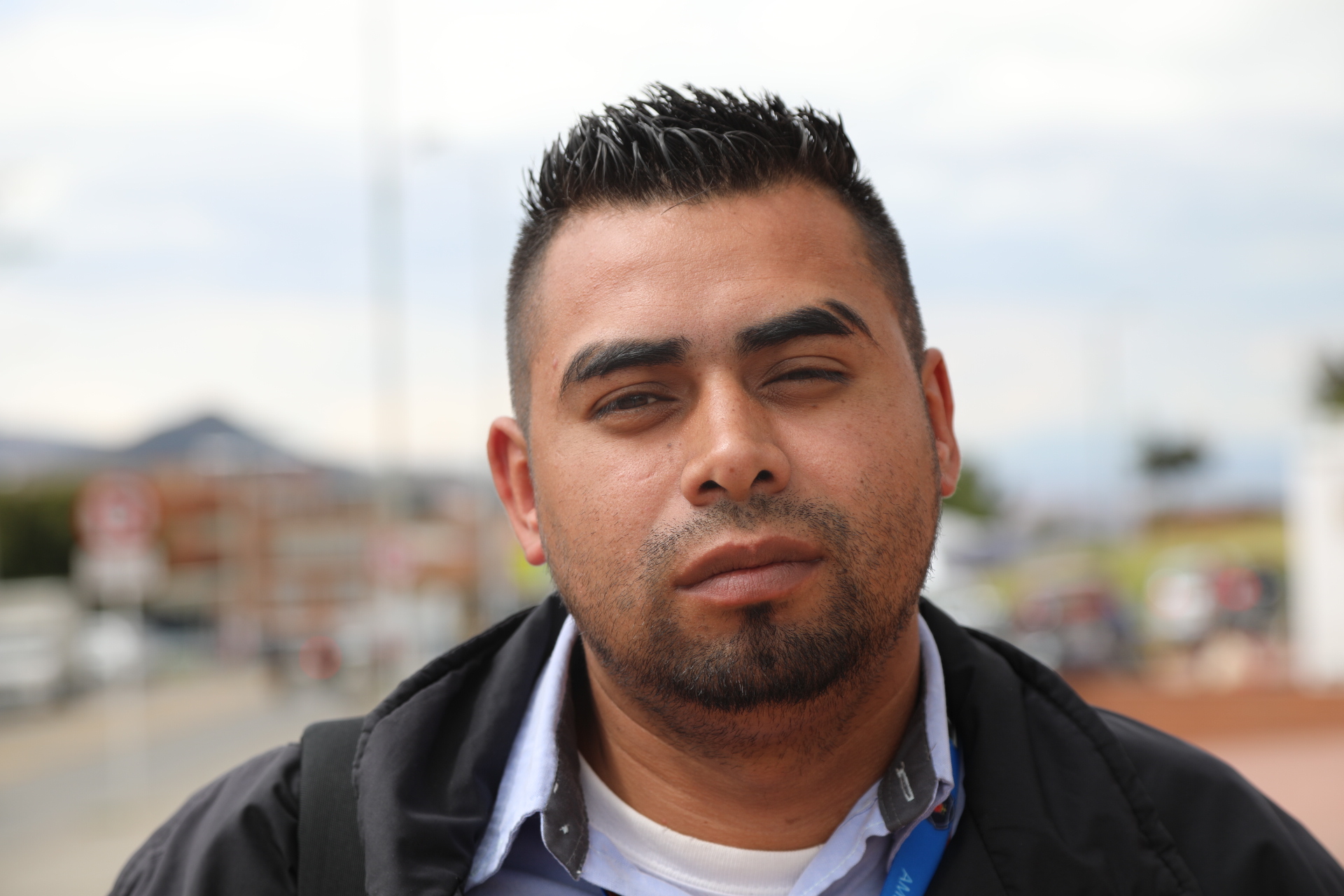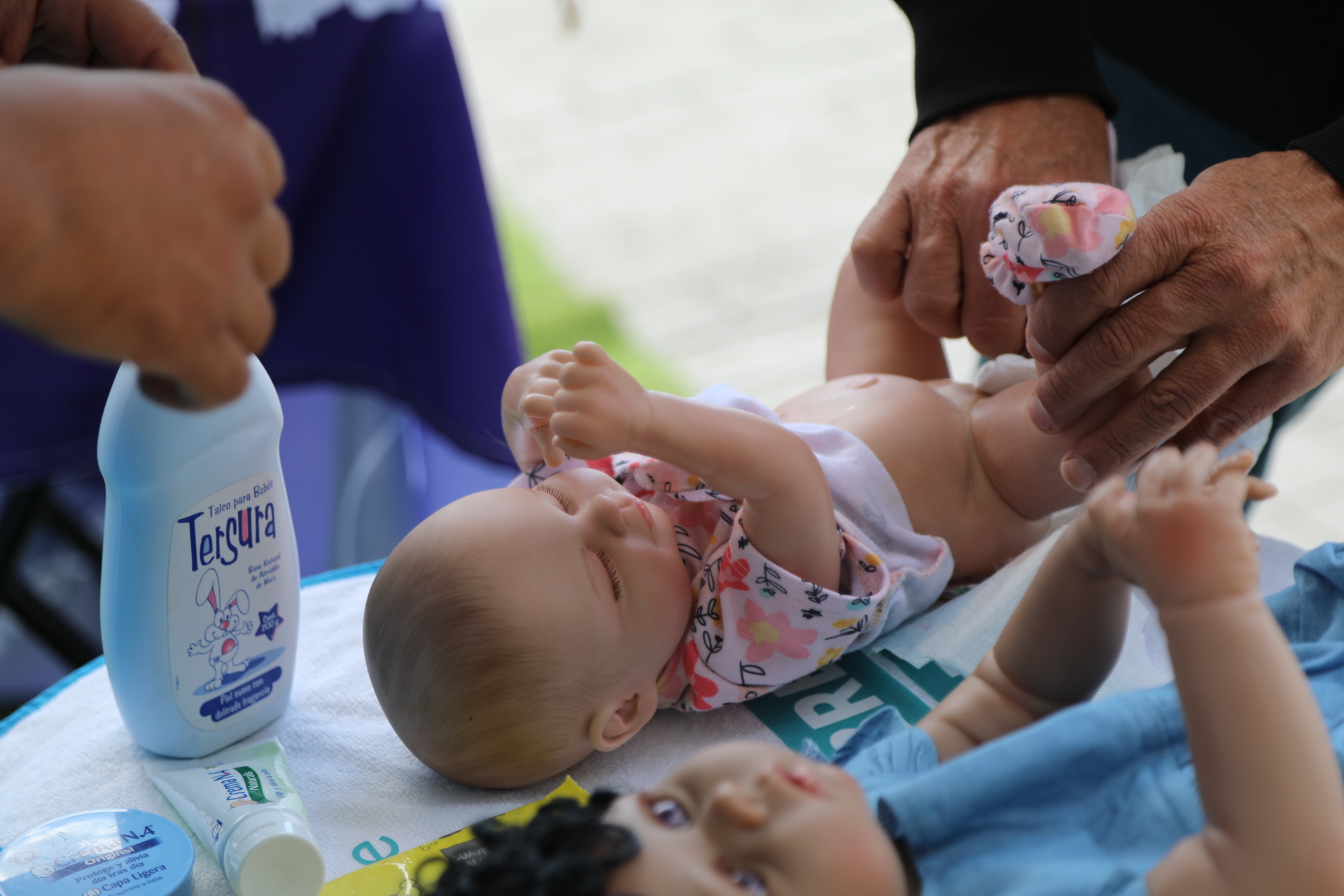It is a rare spectacle in Bogota.
Three women in fluorescent exercise gear stop in their tracks and gawp in surprise. A young mother pushing her newborn in a buggy pulls out her phone and snaps a picture. An elderly man with a bushy mustache pauses to wipe his glasses.
What has grabbed their attention is the sight of a dozen men huddled next to a van in the bright morning sun attempting, with varying degrees of success, to put diapers onto baby dolls. Most are middle-aged adults, but there are a few retirees and one teenager giving it a try.
“That’s not bad for your first try,” says Omar Jimenez, a teacher and trained psychologist, as he inspects a doll presented to him by one of the men in training. “But you could have wrapped the diaper a bit tighter. And it’s a bit wonky. You don’t want the fluids getting out!”
The trainee, Sergio Rivera, nods with a tinge of disappointment. But much like the other men attending this pop-up session in southern Bogota, the 26-year-old is himself a work in progress.
“It’s like a breath of fresh air to learn this,” says Rivera, who has autism and is cared for by his mother. His parents divorced when he was still very young, leaving his mother to raise him and his older brother alone. “I was never taught how to do it as a boy.”
On this warm December day, the men have just 30-minute “taster” slots to learn the basics like using toys to play with children and how to braid the hair of a partner, but the session is part of the wider Escuela de Hombres al Cuidado program, or “care school for men.”
Since 2021, the radical, city-run project has been teaching men across Colombia’s sprawling capital how to be better husbands, fathers, brothers, sons, and any other societally-defined masculine role.
The city’s authorities believe the initiative will go some way to tackling the country’s entrenched machismo culture, or male chauvinism, and by extension encourage men to contribute their fair share of caregiving and domestic work, which they say is at the root of much of the country’s gender inequality.
“My mother worked so hard bringing me up and providing for me,” says Rivera, who came across the event by chance walking along the street. “But it shouldn’t just be left for women to do. Us men have to play our part.”
Research by Bogota City Hall, shared exclusively with CNN, shows that the initiative may already be having some impact. A survey from late 2023 suggests more men and women in Bogota say that they distribute household work equally than in 2021. There have also been changes in beliefs around gender roles and masculinity, aided by men like Jimenez.
This is what a care school for men looks like
Making more caring kinds of masculinities the norm
After another round of changing diapers, the group moves swiftly onto a different lesson in caring: hair braiding. The idea is that the activity, simple as it is, will catalyze men to be more supportive of and attentive to their partners.
Four mannequin heads in dark brown wigs are set up under a canopy beside Jimenez’s van, which travels around the city running introductory sessions like these at a number of sites each week.
The men gather around the models somewhat hesitantly.
“What’s the most important thing when braiding a woman’s hair?” asks Jimenez, wearing a bright turquoise apron as he leads the class.
“Oh oh, wash your hands!” exclaims one attendee with glee.
“Should we put on gloves?” offers another with less certainty.
“Those are nice suggestions,” replies Jimenez. “But my answer is: do it with tenderness.”
The men let out enthusiastic gasps as if a great secret of the universe was just revealed to them and soon get to work at the unorthodox hair salon.
Among them is Luis Martinez, a former construction worker who struggles to braid the mannequin’s hair neatly. His intensive job meant the 67 year old rarely had time at home with his wife and three sons, but now his schedule has freed up and Martinez says the session has opened his eyes to how to be a better husband.
“I’ll do it for my partner,” says Martinez, entwining the long brown locks of the mannequin with his well-worn palms. “She deserves it. I neglected her before.”
The morning’s event intends to make more caring kinds of masculinities the norm and, in turn, rebalancing extensive gender inequalities in relation to unpaid care work.
The gender care gap in Colombia’s capital is particularly stark. About 30% of Bogota’s female population – 1.2 million women – provide unpaid care full-time, averaging 10 hours a day. Women as a whole – including those also in paid work – dedicate an average of five hours and 32 minutes to care work each day compared to two hours and 19 minutes for men, amounting to more than 13 hours spent working each day, according to the 2017 national time use survey. If these hours by women were paid, they would represent 13% of the city’s gross domestic product (GDP).
In 2018, there were 647 million working age, full-time, unpaid caregivers worldwide, according to a report by the International Labor Organization (ILO), providing everything from child and elderly care, to cleaning, cooking and emotional support. About 94% of them (606 million) were women.
More broadly, according to data from 88 countries and territories gathered by UN Women between 2001 and 2017, women on average devote 18% of their day to unpaid care and domestic work, compared with the 7% spent by men. But one region, North Africa and Western Asia, the data shows women do six times more unpaid care work than men.
“The world couldn’t function without these women,” says Clara Alemann, director of programs at Equimundo, an international nonprofit fighting for gender equality. “They do the only job required for all other jobs to exist. But care work is still not properly recognized.”
Equimundo’s 2023 State of the World’s Fathers report stated the need for governments across the world to “promote men’s involvement in care work, prevent gender-based violence, teach the value of care, and promote equitable, nonviolent, caring relationships.”
This is exactly what the Bogota City Hall team is doing, propelled by the city’s first woman and gay elected mayor, Claudia López, when she was in the role, making it one of few cities worldwide spearheading a revolution in the care economy.
‘Women weren't born with DNA of knowing how to care’
In 2020, the city of Bogota opened its first-ever “Manzanas del Cuidado,” or “Care Block.” These neighborhood centers offer numerous free services to caregivers in one space, including laundry, legal aid, daycare, psychological support, language lessons, STD testing, and yoga and dance classes.
In short, they provide care and support for caregivers, like Rivera’s mother, on a scale and scope never seen before.
“A third of the women in Bogota devote their lives to caregiving, but until now there was nothing for them,” says Diana Rodríguez who developed the initiative as the then women’s affairs secretary under Lopez.
The city of 7.5 million people (with the population reaching 10 million when Greater Bogota is included) now has 22 Care Blocks, funded through a public budget of $800,000 annually, and, according to the team, the aim is to have 45 Care Blocks in action by 2035,
Between March 2021 and December 2023, almost 250,000 caregivers benefited from the services, of which 83% (205,000) were women, including 37,000 people who received education for their high school diplomas and training in computer skills and English. An estimated 38,000 women and their families received entrepreneurship support to improve their employability.
The team behind it all, including Rodríguez, believe increasing the involvement of men in care work is the single greatest challenge ahead, which is where the Care Schools for Men come in.
In 2021, Bogota launched a complementary but separate program to the Care Blocks known as “Caring is Learned,” on the basis that caregiving is not a skill that we are born with.
“Women weren’t born with DNA of knowing how to care,” says Juan Cortés, leader of the Care School for Men. “You learn to sweep, you learn to braid a child’s hair and to change a diaper. It’s not a genetic issue, it’s a cultural issue.”
Cortés explained that the scheme was created, in part, following the large volume of calls City Hall received from men during the pandemic to a hotline it created, expressing frustration that they were unable to look after their families after a loved one became ill or had died.
Part of its strategy is to offer a range of formats for classes and, importantly, to go to where the men are. The scheme targets typically male-dominated environments – from football pitches and automobile repair shops to bus depots and prisons.
‘Men know how to care, just in different ways’
At a Care Block in Bogota’s southern district of Usme, a strong scent of aftershave is in the air.
About two dozen men in uniforms of navy jackets, light blue shirts and gray trousers shuffle into a classroom and exchange fist bumps. Most have neck and arm tattoos, thick silver chains and a considerable amount of hair gel.
A video projection on one wall simply says: “Everything you feel is valid.”
Today, the group – all bus drivers, 95% of whom in Bogota are men – are taking part in the second of three “conversation” sessions, on the themes of jealousy, loss and frustration as part of the Care School for Men.
The interactive, open nature of these conversations are aimed at demographics that are particularly difficult to convince when it comes to changing mindsets, and given their brevity, are more accessible for working men to attend.
Bus drivers were earmarked for special attention after authorities noted an unusually high level of traffic accidents in the district – something they attributed to drivers’ frustration and struggles to deal with anger, according to the Care School for Men team.
“What is loss and how do you deal with it?” Jimenez asks the room.
Lively discussion erupts and the Care School teacher struggles to control the room as men talk over one another and the volume rises. But then one driver raises his hand.
“I lost my grandmother 15 years ago,” says William Boye, a 31-year-old driver, as he leans against a wall. “I still feel the pain. But the problem is the stigmatization of society. We’re not supposed to show our emotions. We can’t speak about them.”
The chatter shudders to a halt and others begin to share their own testimonies of difficult breakups and lost family members.
At the end of the session, the drivers read a poem aloud together: “Not Anymore,” a tale of heartbreak by the Uruguayan poet Idea Vilariño. There is a pin-drop silence as some of the group look visibly moved, palms pressed against foreheads.
“It’s complicated,” says Ferley Saenz, a 40-year-old bus driver with two sons, as his colleagues file out of the classroom. “We haven’t had the best role models.”
Some in the group were beaten with belts as children, he says. Others didn’t have fathers growing up. And he shares he himself was hit by his dad if he did something wrong.
For Jimenez, given such challenging personal histories, the therapeutic, conversational approach is necessary and effective.
“Men know how to care, just in different ways,” he says. “Their care is more controlling, disciplined and invasive. It’s better for us to listen to the men and talk with them to help process these emotions. Only then will they really change.”
Some have made progress. Since beginning the Care School for Men training last year, Saenz has started to regularly cook for his family a dinner of arroz paisa, a Colombian dish of fried rice, sausage and eggs. And he makes extra effort to find quality time to speak with his children even if he’s drained after work. “I’m trying to be a better father,” he says.
The team is aiming to train at least 70% of the company’s 600 drivers and City Hall is leveraging its links with other public institutions to source more men.
But while Saenz’s group is a receptive one, not all are.
“They can be rude and aggressive,” says Cristina Soler, a teacher at the Care School for Men. “There is a strong culture of machismo we have to transform. But we can’t just tell them what to do. We have to listen to their experiences. It’s not easy.”
Colombia’s culture of machismo is widespread. A survey of more than 7,000 people in Colombia by the European Union in 2019 found that 70% of respondents were “moderately sexist”. That deep-seated sexism impacts everything from job opportunities to gender-based violence. In 2022, there were 47,771 reported cases of domestic violence in Colombia, the equivalent of about one every 11 minutes, according to Colombia’s National Institute of Legal Medicine and Forensic Sciences.
More than 400,000 people have benefited to date
“The greatest difficulty we have is convincing men [to take part],” explains Cortés. “It’s not a topic they are easily interested in, so we have had to be flexible in our approach.”
To maximize reach, the initiative is delivered through a multi-pronged system of in-person lessons at Care Blocks and other municipal locations, as well as mobile pop-up sessions like Jimenez’s van and virtual classes.
The main school has a full curriculum made up of 24 modules that takes a few months to complete. They cover home care, such as washing and repairing clothes; caring for newborns, pregnant women and the elderly; emotional care such as anger management; as well as care for the environment, promoting sustainability and greener living in the city.
The curriculum was developed with a number of feminist caregiving experts over several months in 2021. “We worked with these women to identify what the most important topics would be,” explains Cortés.
Aside from the practical skills, an equally crucial goal is to tackle outdated cultural beliefs.
According to the surveys from 2021 shared with CNN by Bogota City Hall, 51% of men in Bogota agreed that most men believe “they should help at home, but that it is not their responsibility.” The team also found that 76% of men said they would like to learn to control their emotions better but did not know how, while 48% of the men did not recognize their father as an important figure in their upbringing, and 84% of men did not include love as an emotion they felt for their fathers.
As a result, responses to the mobile sessions are also mixed, according to Alexandra Avendaño, one of the school’s coordinators. Some men are “curious but skeptical,” she says, while others are interested but are “afraid of being seen by peers.” Some, however, are comfortable to openly participate — and once they do, many sign up for more classes.
As of February 2024, some 400,000 beneficiaries, including views of online videos, have been recorded for the care schools, among which more than 9,800 men have benefited from in-person sessions, according to the team. Women are also welcome to join, believed to be “essential allies” in the cultural transformation, according to Care School leader Cortés. “Their presence and participation not only widens the diversity of perspectives and experiences in the process, but also fosters solidarity and collaboration between genders,” he added.
There appear to have been some noticeable shifts in mindsets, according to two surveys City Hall commissioned before and after the Care Schools for Men began. The studies were designed to be representative of all adults in the city but had some significant methodological differences between the two surveys, with the 2021 survey interviewing 1,009 people by telephone and the 2023 survey interviewing 2,617 people in-person.
Among the men sampled, those who said that they are entirely responsible for household chores roughly doubled between the two surveys, from around one in ten in 2021 to one in five in 2023. But it was still less than the 39% of women who said the same in 2023. (which also increased from 27% in 2021)
In 2021, nearly 20% of men agreed that most Bogota men believe they would “lose their manhood” if they dedicated themselves to household work. In answer to a similar question in 2023, 12% of men agreed that they, themselves, felt they would lose their manhood.
However, other findings are less clear-cut.
The amount of men who said they do not help at all with household chores was roughly 5% in both surveys. The percentage of men who agreed that sons and daughters “need their mothers more than their fathers” was also relatively similar across both surveys. In 2023, the respondents who believed women are born with a “natural gift” for care work was stubbornly high at 45%.
But Cortés believes there is a “more positive vision” and awareness of domestic care work in Bogota, with women caregivers gaining greater recognition, but he adds this may cause some to continue thinking that they are preternaturally disposed to do it.
“We are seeing the first fruits of progress,” he says. “But we are still far from changing the root problem.”
Perhaps fittingly, it’s now up to a man to lead Bogota’s next steps in transformation: Carlos Fernando Galán, who became mayor of the city in January 2024 following regional elections, has replaced Lopez after she reached her term limit.
Galán has pledged to continue the work under his administration, and on March 15 he inaugurated the city’s 22nd Care Block, which, beyond the standard services, will focus on accelerating the wider “cultural transformation” around care work by bringing the efforts of multiple local organizations together.
“Programs like this … generate cultural transformations in society that promote the redistribution of care work and change the role of men in the home,” Galán said in a speech during the launch.
There’s also been huge interest in replicating the project across the world.
Monterrey, the second largest city in Mexico, inaugurated its first Care Center last year after the mayor visited Bogota. According to the City Hall team, Uruguay’s capital Montevideo, inspired by Bogota, is installing free laundromats for caregivers. Ecuador’s capital Quito has launched a care system, there is a pilot of care blocks four in neighborhoods in Santiago de Chile and the mayor of Freetown, Sierra Leone, is testing a District Care System based on Bogota’s example, according to the team at City Hall.
But even with the valuable lessons learned from Bogota’s pioneering schools for men, there’s a long road ahead.
“There’s still so much work to be done across the world if meaningful change is going to be achieved,” concludes Equimundo’s Alemann. “We need to show to men their stake in gender equality. And they need to step up.”









